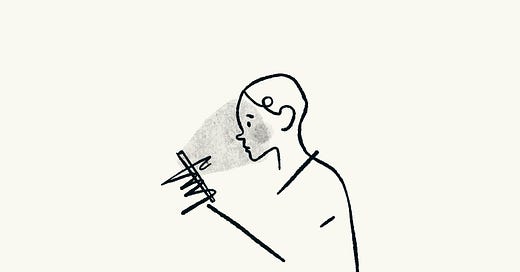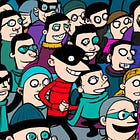Anti-Social Media
How our technology habituates the paradoxical relationship between social media and social isolation
I was watching an episode of Seinfeld last night about the Friars Club. I’ve seen this episode five or six other times and each time I had the same thought: What is the point of a social club? Why do people pay a lot of money to be surrounded by others? There are people everywhere.
But this time my reaction was different. A place to meet people who want to have an authentic interaction with others would be, frankly, refreshing. I have realized just how deprived I’ve become of genuine social interaction over the past little bit. No, this isn’t because of covid or because I have young kids, this is because of the way our modern social landscape has evolved.
I think everyone is a bit annoyed with social media. Just this morning I read
’s article My growing indifference to social media. I don’t want to write another article about frustrations with social media; especially since Meaghan put those frustrations much better than I can. I do, however, want to take a moment to observe just how much our technology affects our life outside of the digital realm.Social media doesn’t only distract us from moments in real life with the jingle of our phone, it also affects the moments in which we remain. It has redefined our entire social outlook as a society. Studies have shown that more social media use leads to greater perceived social isolation. We’ve gone from caring about building meaningful relationships with the people close to us to worrying about what people halfway across the globe think.
This transition has caused an almost complete disregard for our local communities. When I was a kid, I would spend all afternoon riding my bike around the neighborhood with my friends. I remember stopping by my friends’ houses, eating their food, and spending time with their family. Now, I barely know the names of half of my neighbors.
I think this is due to a new inauthenticity experienced in relationship building. Social media has simplified our entire social credit system to a single a number. A high follower count is good and a low follower count is bad. In essence, the social aspect of life is no longer about making deep fulfilling relationships, it’s just one big popularity contest.
This popularity contest is close to unavoidable. Social media has become the de facto method of communication. It’s a requirement for societal involvement even if you don’t enjoy it. Social media is the expected medium for receiving updates, messaging friends, and keeping up with others. If you want to be part of a community, social media is a necessity. That’s where modern-day communities are.
’s article Prison Break describes social media as a prison we’re all willingly trapped in:These new prisons are not structures of concrete and barbed wire, but the substance of our entire world - online and offline. There is no need for guards because we are constantly watching one another. Your guards are your friends, your family, your colleagues, potential partners, and everyone you ever meet.
While we may enter into this prison via our technology, it follows us when we log off and breeds inauthenticity into the relationships we build in real life. More detail and elegance are put into this topic in Nishant’s article. I suggest you give it a read and subscribe to The SneakyArt Post if you enjoy it.
This quote from Nishant’s article hits the social media nail right on the head:
On social media, I am a brand, but with this newsletter, I enjoy the tremendous freedom of being a person again.
On social media, you don’t interact with people—you interact with brands. Personal accounts have ceased to be people and are instead that person’s online brand. How are we supposed to interact genuinely when no one is their authentic self?
Do you want to be a brand or do you want to be a person?
I’ve employed a tactic toward the unimportant things in life recently as my bandwidth has started to dwindle: I just don’t care.
I’m not going to care about the social credit number or how other people use social media. I’m going to care about the people I get to know on social media just like I do in real life. I’m going to be my genuine, authentic self.
A study shows that positive social media interactions boost one’s mental health while negative social media interactions have a profoundly negative impact on one’s mental wellbeing. With all the negativity found on the internet, it’s no wonder social media has made such a negative impact on real life. The goal with my approach is to capture the positive social media interactions while letting the negative interactions slide.
Will this approach work? I don’t know. I’m going to give it a try and I’ll let you know how it goes.
Be genuine with me
I love writing, but I love conversing about these topics even more! Connect with me on LinkedIn, X, and YouTube. And, of course, subscribe for more articles like this.
Support me for pennies
100 of them to be exact. Support independent writing and let me know you enjoy my articles for just $1 per month.







